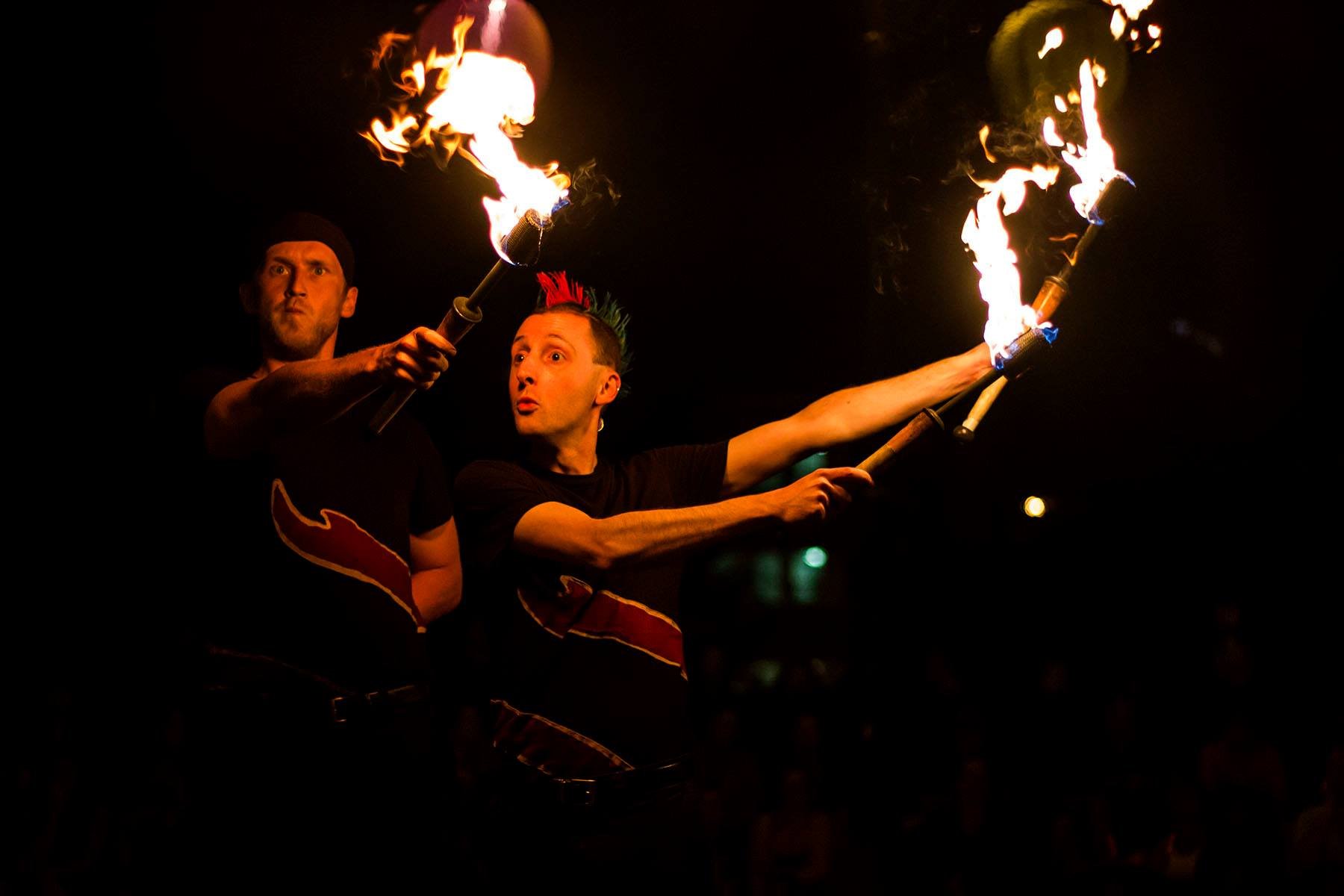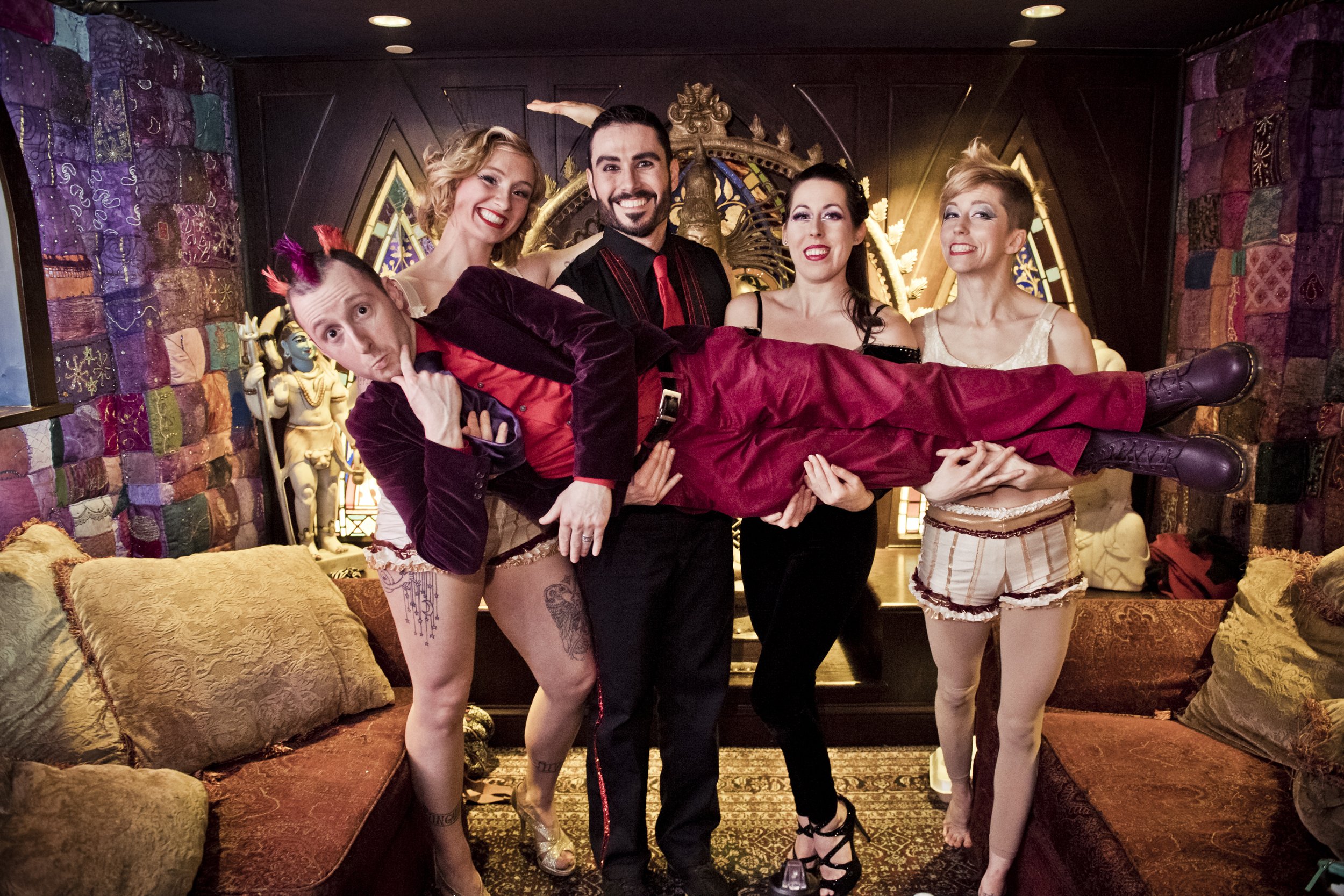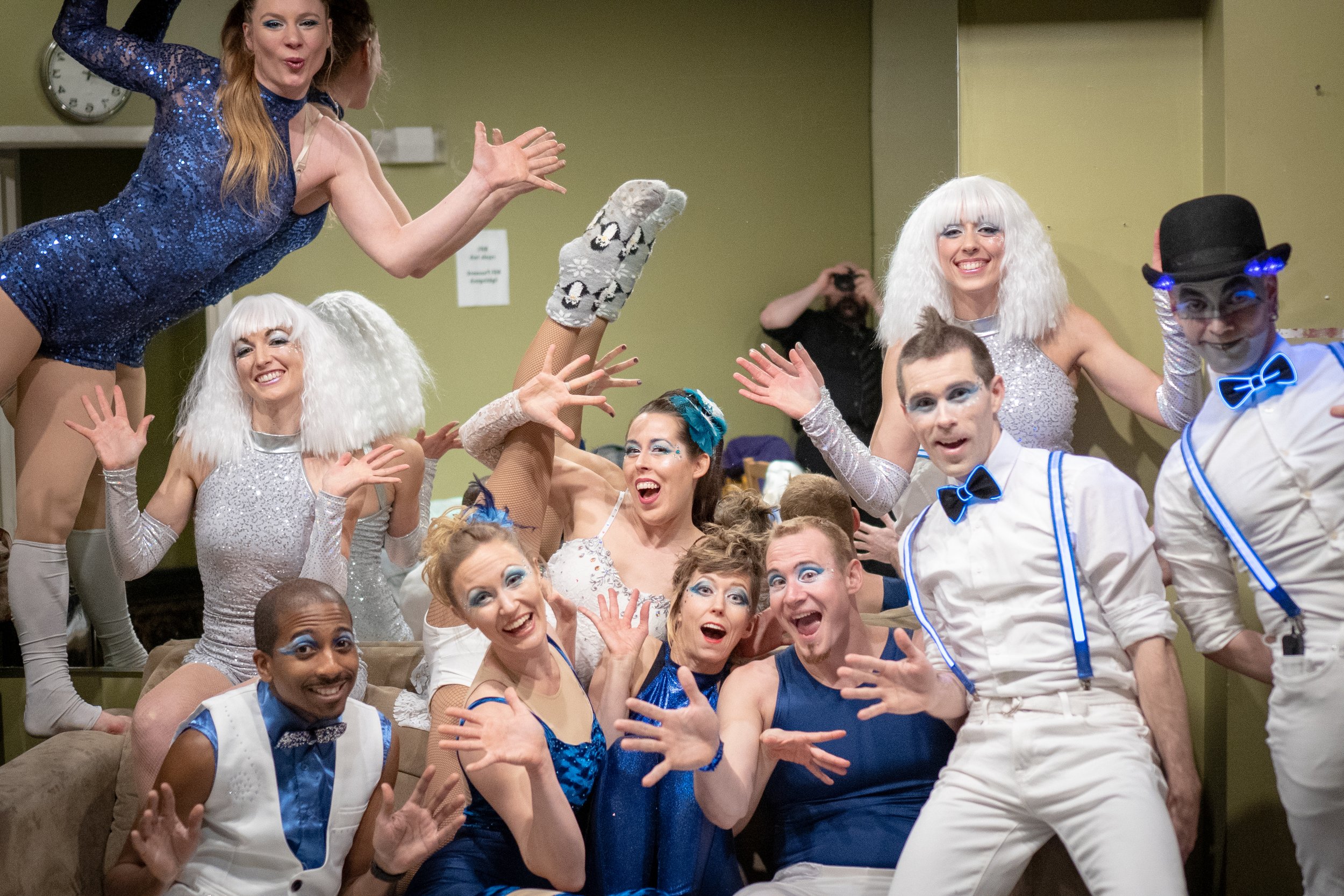Fire Stilt-Walk with Me
You need a stilt-walker? We know a guy. Michael “Mooch” Mucciolo is a performing artist, co-founder of The Boston Circus Guild, and all-around nice human. Be it juggling fire or contracts, Mooch is helping foster public appreciation for circus arts, and the skilled performers who make magic every day. Performers from the Guild will be with us on June 16 for A Night at the Circus, so we had a little chat with Mooch to get the full backstory.
atac: Hello, Michael “Mooch” Mucciolo. We’re assuming it just said “Michael Mucciolo” on your birth certificate. What’s the origin story behind the Mooch?
Michael Mucciolo: Indeed it does! My last name is very Italian and usually pronounced ‘mooch-e-oh-low,’ hence an easy nickname with Mooch. But I am comfortable being called most anything as long as I know that is someone’s plan; I even spent a year in college being called ‘Frank’ by a few friends when I gave them the option to use whatever name they felt most comfortable with.
atac: Frank, could you give a quick rundown of what the Boston Circus Guild is, when it was founded, etc?
MM: Boston Circus Guild (BCG) was created as an organization very late in 2009 with the goal of getting professional circus artists sustainable and safe work in the Boston area. I, and the other founders, felt we could help all of the amazing talent here by creating a single professional circus organization. We had three main goals:
Connect local professional performers with others in the area to promote creative development.
Take on negotiating with clients, marketing, contracting, etc so performers can be focused on all of the rigors of training and performing
Create a single organization for event planners to connect with as a ‘one stop shop,’ giving more performers an opportunity to get work—prospective clients would be introduced to more performers than had they tried to reach out individually.
atac: All this knowledge of need-areas and how-to…did that grow out of your experiences with A Different Spin at Vassar? I’m also interested to know about the educational outreach you did there.
MM: There was a circus club at Vassar where I started my own circus journey—meeting the performers who would join me in A Different Spin, a professional fire and circus arts company I founded in 2006. After classes at Vassar we would meet on the quad and teach each other juggling and acrobatics skills. It was a very collaborative group where it was not about getting better than other individuals at a skill, but how one person’s interesting skill could combine with someone else’s. There was a joy for exploration and sharing newfound knowledge with others to help them unlock a skill that led to the creation of multiple group circuses and fire shows on campus.
After our club traveled to another college to perform one of our group fire shows it led me to believe there was a career path possible bringing the awesomeness of choreographed fire performance to audiences with colleges being the obvious first market to explore. Offering juggling and general circus skills workshops to those clients also naturally grew from the spirit of sharing in knowledge from Vassar’s circus club :) A Different Spin began in California and then I relocated the company to Boston in late 2008 with a different group of Vassar grads, one of whom was Ricky Hawkins. He and I ran the business as a partnership, and were two of the original founders for BCG.
atac: I read in another interview that you feel audiences “often need permission to have fun.” Can you elaborate on that—where you think it comes from; how can performers counteract anxiety?
MM: It’s not so much anxiety as I think audiences are often expected to stay quiet whether it be watching movies or ‘respectfully’ watching a performance. Encouraging them that they should express their excitement and enjoyment can help loosen them up and it benefits everyone—performers love the energy from a responsive crowd and hearing your fellow audience members cheer can make you more willing to exult in the experience. Watching a circus show is a magical experience and it is often great to remember that it is best shared with as many people as possible! Everyone in the audience is having a unique live performance experience that will never be exactly the same again so celebrate that!
atac: You seem to be juggling a lot, quite literally, as you are both on stage and serve as the Guild’s Booking Manager. How do you make room for it all?
MM: To be honest, I spend the vast majority of my time booking for BCG. It is a bit bittersweet as I absolutely love performing, but I am passionate about creating performing opportunities for our talented roster of performers and have shown a knack for connecting with clients. This means I need to focus on getting those contracts signed first and foremost! It is a real joy when the stars align for a group fire show or an opportunity for me to work with the remaining jugglers (Ricky and Tim) from A Different Spin like at our now-annual Cirque du Hampton Beach or put on our signature 4-performer Fire Show at the Ignite! Festival in Somerville.
atac: Elaborating a bit on that…how does being a performer inform your role as Booking Manager, and vice versa?
MM: BCG was founded and run by performers who had directed/produced our own events, so we all had the knowledge of the many aspects that go into making an event happen behind the scenes. This has been invaluable in assisting clients with adding amazing professional circus performers to their own events, as we know some of those logistical quirks that happen at every event and can anticipate issues before they happen. As performers we were also aware of what aspects of event logistics can distract a performer from doing their best possible work so we could set client expectations in advance and advocate for safe and supportive performance conditions for our performers before our team even arrives onsite.
atac: So, fire. It will respond to even the smallest changes in air movement; and you know…a door opens, a fan turns on. A lot can happen in a venue. When you’re performing with fire—how do you choreography it?
MM: Fire performance definitely has elements of unpredictability and danger, but a combination of careful choreography (spacing between performers and audience, flexibility in movement for changing conditions, etc) and tons of practice can allow for quick thinking when the environment changes. Great fire performance requires a strong foundation in the skills *without* fire before attempting the choreography with fire! And there is no better teacher than experience when it comes to fire performance as acclimating yourself to the changing lights and sound as fire consumes oxygen around you is key in making it look effortless and intentional.
atac: There’s been no shortage of coverage about how the pandemic impacted live music venues, but I haven’t read a lot about the circus community. I imagine it was a lot harder to scrape by; you can’t Zoom in the same way some bands could…how has the Guild been able to stay afloat?
MM: The live entertainment industry was hit extremely hard across the board in 2020-2021. And you’re right, I would be lying if I said circus performers weren’t devastated during this timeframe. A large percentage of our roster of professional performers rely on income from performing at live events and teaching circus arts in person so having both revenue streams cut off was crushing. Our board of directors were amazing in helping compile resources for individual performers to apply for grants and financial assistance and we organized a Performer Relief Fund to raise money to distribute 100% to the performers on our roster in need of support due to the loss in income.
BCG lost a lot of money in 2020—not just in anticipated contracts based on 10+ years of data, but in actual funds spent on things like our insurance policies, payroll while we were in limbo, and fixed subscription costs for everything from storage unit rentals to Dropbox subscriptions. If it wasn’t for the work of our leadership team over those 10+ years when it came to budgeting and saving funds for cash flow and potential shortfalls it is quite possible that we would not have been able to weather those losses.
You could point to both community support for the Performer Relief Fund, some streaming content, and years of underpaid administrative work to get a foundation together that kept BCG afloat and able to both actively support our performers, and be ready to leap into event coordination the moment contracts came back in mid 2021.
atac: We love radical admin! You hear about people who are like, “a comedian’s comedian or a drummer’s drummer…” and I wonder who from the circus arts world are like, a few unsung heroes? Artists who are lesser known, but help set the bar.
MM: The U.S. is sadly lacking in a lot of the publicly funded performing arts programs of other countries, but Arts Emerson has done a great job of attracting international circus shows to Boston, mostly from Canada. Both Machine de Cirque and 7 Fingers have been excellent companies that Arts Emerson has secured. 7 Fingers is creating some beautiful shows I often will see multiple times when they come to town! Bottom line: show arts centers that you want to see more circus shows by making sure to see circus shows when they come to town :)
atac: I imagine in your travels, you’ve seen a thing or two go wrong. Got any good stories or examples of near-fails, harrowing recoveries, etc?
MM: Much of our work as a professional circus organization and working onsite with professional artists is in ensuring performance conditions are as safe as can be so opportunities for things to go wrong are limited. We did have a wild experience where the audio team provided by the client totally dropped the ball with our music for a giant, twenty three-performer customized fire performance. The music cut out part-way through the choreography, and then it did so *again* ! To cap it off, it cut out one final time, and instead of restarting the music they switched to an entirely different song for the final 2 minutes of the routine. The cast of 23 did a fantastic job keeping as close to the choreography as possible despite the wrong music playing!
atac: Ouch! OK — how about a good musical situation. With Cirque of the Dead, you worked with Boston-based musicians Emperor Norton’s Stationary Marching Band and that seemed to go well. Any other names of local talents you’d like to help hype?
MM: ENSMB is actually our in-house Circus Band! Their founder, Chuck Lechien, was one of the original founders for BCG with me so we’ve always been connected.
To be frank, we don’t hype individual performers/companies because it makes things confusing for clients looking to hire talent. As I mentioned earlier, it also gives more performers an opportunity if a client comes to BCG rather than an individual—the individual isn’t going to be in a position to recommend other performers (either because it is awkward to do so, or they don’t know who to recommend) nor are they likely to be able to coordinate multiple performers the way that BCG can. If a client comes to BCG looking for a stiltwalker, it’s far easier for me to recommend they also book an aerialist and partner acrobats as we can do it all in-house!
atac: All business! =) So what should audiences coming to A Night at the Circus expect from Boston Circus Guild performers? Who’s coming out, etc?
MM: We have a fantastic trio of performers coming to A Night at the Circus and can’t wait to provide spontaneous spectacle and magical moments with attendees! We will be showcasing some juggling, handbalancing and stiltwalking throughout the event space. Live circus entertainment is created by real people so it is absolutely encouraged to connect with our artists as people; don’t be shy, feel free to chat with our performers and ask to pose for photos if you enjoy their talents. We welcome everyone to engage and delight in an evening of fun with us!
*
Grab your tickets for A Night at the Circus today. The party goes down on Friday June 16!
Tags:




